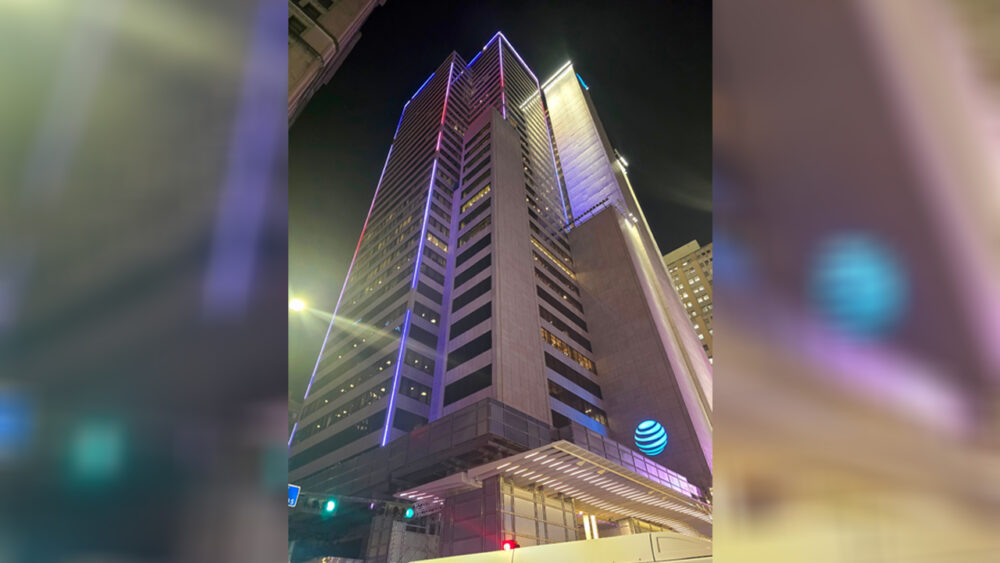AT&T is refusing to answer questions about its real estate plans and has not affirmed on the record that it intends to keep its headquarters in downtown Dallas.
A report commissioned by Downtown Dallas Inc. and prepared by Boston Consulting Group warned that an AT&T relocation could slash downtown property values by 30%, erasing $2.7 billion in overall value and costing the city $62 million annually in property tax revenue.
The telecommunications giant’s lease at Whitacre Tower, its longtime downtown home, runs through 2030. But multiple sources reportedly told the Dallas Business Journal the company has toured northern suburban campuses, including the 1.8 million-square-foot Park at Legacy in Plano, the redeveloped site of JCPenney’s former headquarters.
Separately, sources familiar with AT&T’s real estate discussions told The Dallas Express they believe a relocation to the suburbs is increasingly likely.
DX initially approached AT&T President John Stankey and the company communications team about a recent Dallas Business Journal story on the suburban tours. Stankey did not respond. Spokesman Jim Kimberly told The Dallas Express, “We do not comment on rumors and speculation.”
After sources with knowledge of the matter told The Dallas Express that the move might already be a done deal, the outlet again sought clarification from AT&T. The company did not provide any further statement affirming its commitment to downtown Dallas.
The potential exit would mark another major corporate departure from the city’s core, following moves by Bank of America and other prominent firms in recent years. Real estate executives have said it is “widely known” that AT&T is “looking up north.” Business leaders and urban advocates warn that such relocations could deepen concerns about crime, cleanliness, and quality-of-life issues in downtown Dallas.
The BCG analysis for Downtown Dallas Inc. underscored the stakes, warning that the potential for corporate relocation is real. The report listed recent examples of law firms moving from downtown to Uptown and included a note from a corporate stakeholder that “AT&T would consider relocating if public safety downtown is not addressed.”
The same analysis highlighted how neighboring areas like Victory Park, Uptown, and Turtle Creek are experiencing an unprecedented boom with more than $2 billion in residential and corporate development underway. It also cited losses in hotel airline contracts due to homelessness downtown — more than $4 million annually — while Fort Worth has benefited.
The development also comes months after AT&T’s seat on the board of Downtown Dallas Inc., which was at the center of a legislative fight over the future of Public Improvement Districts (PIDs). Senate Bill 2594 would have delivered a major infusion of funds and restructured PID governance across Texas.
That bill sparked hours of testimony at an April 28 hearing before the Senate Committee on Local Government in Austin. Supporters argued that PIDs needed more resources to address safety, sanitation, and urban blight.
“Downtown Dallas is a disaster,” Monty Bennett, chairman and CEO of Ashford Inc. and publisher of The Dallas Express, told lawmakers. He urged them to “invest in a bright, clean, safe future” by passing the legislation.
Billy Prewitt, representing downtown property owners, also testified in favor, saying the bill was needed to correct what he described as governance problems. “Please pass Bill 2594,” he told senators.
Opposition from Dallas officials and some lawmakers ultimately stalled the measure. The bill later died in committee.
The City of Dallas has since continued to approve service plans for all 15 of its PIDs, including the Downtown Dallas PID, which funds supplemental services such as enhanced security, landscaping, and street cleaning. On August 27, 2025, the City Council adopted the 2026 service plans, assessment rates, and assessment rolls, according to city records.
When asked about the legislation and its potential connection to headquarters plans, AT&T gave no on-the-record response.
Still, concerns about governance and performance remain. A report commissioned by Downtown Dallas Inc. documented rising crime rates and sanitation problems despite ongoing investment. Critics have argued that, while downtown boosters tout the role of PIDs, basic conditions have continued to deteriorate.
Speculation continues to swirl about whether such concerns factored into AT&T’s decision not to push more forcefully for PID reform legislation — and whether the company is evaluating alternatives to its downtown headquarters.
Any decision by AT&T to leave downtown would carry both symbolic and practical weight. The company is one of the most visible anchors of the central business district, employing thousands of workers, maintaining a prominent presence at Whitacre Tower, and helping guide Downtown Dallas Inc. from its position on the board.
Abandoning its downtown headquarters — or even leaving that possibility unanswered — signals a loss of confidence in the city center and could accelerate the shift of corporate investment to suburban hubs, according to the DDI/BCG report.
The analysis estimated that such a relocation could trigger a 30% decrease in downtown property values — wiping out roughly $2.7 billion in overall value and costing the city $62 million annually in lost property tax revenue.


